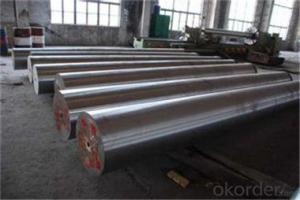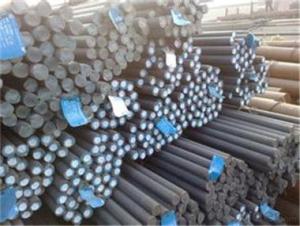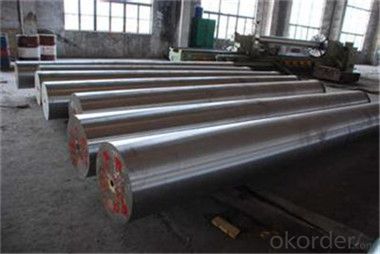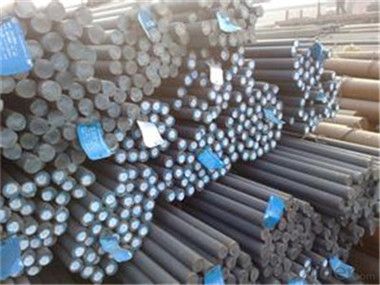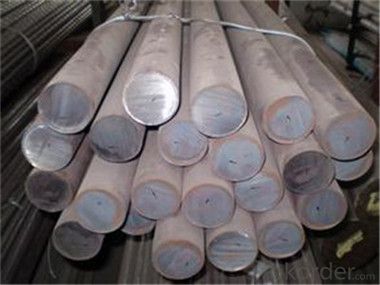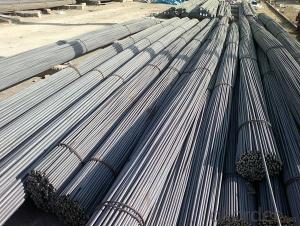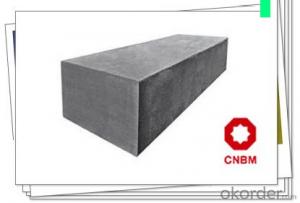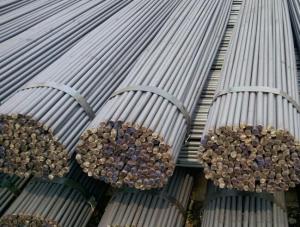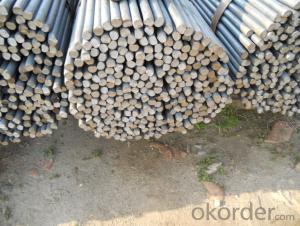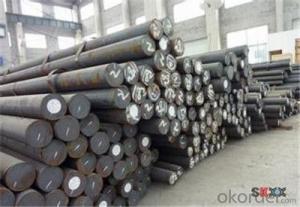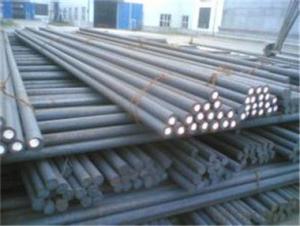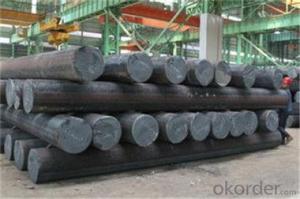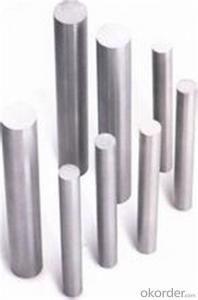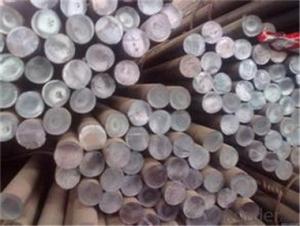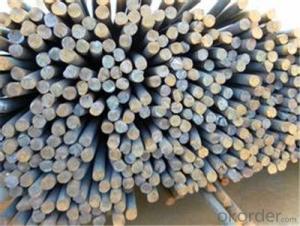Steel Round Bar Reliable Manufacturer from China
- Loading Port:
- Lianyungang
- Payment Terms:
- TT OR LC
- Min Order Qty:
- 221 m.t.
- Supply Capability:
- 200334443 m.t./month
OKorder Service Pledge
OKorder Financial Service
You Might Also Like
Description of steel round bar:
1. Commodity: Round steel bar
3. Technical: Hot rolling
2. Length: Min. 5.8meter, according to requirement.
3. Diameter: 16mm-250mm
5. Packing: In Bundle or according to your requirements.
Festures of steel round bar:
1.Dia 80-800mm Length:2000-13000mm or as required
2.Technique:Forged
3. Annealing after forging:heat to 840-860°c,keep 2-4H,coolbelow to 500°c,hardness≤285HBS. Isothermal annealing after forging:heat to 540-860°c,keep temperature 2-4H,furnacecold to 740-760°c,keep temperature 4-6H,to 500°c,hardness≤255HBS.
Specifications of steel round bar:
1. Standards: AISI 4340 8620 8640 4320 , JIS SNCM8 GB:40CrNiMoA
2. Specification: Dia: 80~450mm Length:2000-13000mm or as required
3. Process: EAF+LF+VD ( necessary) UT+ Peeled +Turned + Heat Treatment (optional)
4. Chemical Composition (%):
C | Si | Mn | S | P | Cr | Ni | Cu | Mo |
0.37-0.44 | 0.17-0.37 | 0.40-0.80 | 0.025(max) | 0.025(max) | 0.60-0.90 | 1.25-1.65 | 0.025(max) | 0.15-0.25 |
Images of steel round bar:
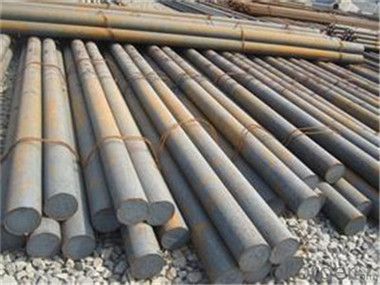
FAQ:
1. What is your package?
Packing situation: standard seaworthy packing or as customer required.
2. How long is the lead time?
Delivery time: 45 days after order confirmed.
3. What payment term do you accept?
Payment: T/T or L/C at sight.
- Q: What is the cost of steel round bars?
- The cost of steel round bars can vary depending on factors such as the size, grade, and market conditions. It is recommended to contact suppliers or check online catalogs for the most accurate and up-to-date pricing information.
- Q: What are the different grades of carbon steel round bars for structural applications?
- The different grades of carbon steel round bars commonly used for structural applications include ASTM A36, ASTM A572, and ASTM A992.
- Q: Are steel round bars suitable for electrical conductivity?
- No, steel round bars are not suitable for electrical conductivity.
- Q: What are the different types of steel round bars used in the manufacturing of shafts?
- When manufacturing shafts, various types of steel round bars are commonly used. The selection of the steel round bar depends on the specific application and requirements of the shaft. Here are some of the frequently utilized types: 1. Carbon Steel Round Bars: These round bars are the most commonly used in shaft manufacturing. Carbon steel provides good strength and toughness, making it suitable for a range of shaft applications. 2. Alloy Steel Round Bars: By adding elements like chromium, nickel, or molybdenum to carbon steel, alloy steel round bars are created. This enhances the strength, hardness, and wear resistance of the shaft, making it appropriate for demanding applications. 3. Stainless Steel Round Bars: Stainless steel is highly resistant to corrosion and offers excellent mechanical properties. It is commonly used in shafts that require resistance to corrosion, high temperatures, or harsh environments. 4. Tool Steel Round Bars: Tool steel round bars are renowned for their exceptional hardness, toughness, and wear resistance. They are used in shafts for cutting tools, molds, and dies that necessitate high performance and durability. 5. High-Speed Steel Round Bars: Primarily used in shafts for cutting tools such as drills, mills, and taps, high-speed steel round bars possess excellent heat resistance and can withstand high cutting speeds without losing their hardness. 6. Mild Steel Round Bars: Mild steel round bars are low carbon steel bars that offer good weldability and machinability. They are commonly used in shafts for less demanding applications that do not require high strength or hardness. Considering the specific requirements, such as strength, hardness, corrosion resistance, and temperature resistance, is crucial when choosing the appropriate type of steel round bar for manufacturing shafts.
- Q: Are steel round bars available in different shapes other than round?
- No, steel round bars are typically only available in round shapes. The term "round bar" refers specifically to a cylindrical shape with a circular cross section. However, there are other types of steel bars available in different shapes, such as square bars, flat bars, and hexagonal bars. These bars have specific applications and properties that make them suitable for different uses. So, while steel round bars are limited to round shapes, there are various other shapes of steel bars available in the market to cater to different requirements.
- Q: What are the advantages of using nickel-chromium-cobalt alloy steel round bars?
- There are several advantages of using nickel-chromium-cobalt alloy steel round bars. Firstly, this type of alloy steel has excellent corrosion resistance properties. It can withstand extreme environments, such as high temperatures, humidity, and exposure to chemicals, without succumbing to rust or corrosion. This makes it ideal for applications in industries like aerospace, marine, and chemical processing, where durability and longevity are crucial. Secondly, nickel-chromium-cobalt alloy steel round bars possess exceptional strength and toughness. They have a high tensile strength and can withstand heavy loads and impacts without deforming or breaking. This makes them suitable for applications that require structural integrity and resistance to deformation, such as in the construction industry or in manufacturing heavy machinery. Moreover, this alloy steel exhibits excellent heat resistance. It can withstand elevated temperatures without losing its mechanical properties, making it ideal for applications that involve high-temperature environments, such as in power generation, oil and gas exploration, or furnace components. Additionally, nickel-chromium-cobalt alloy steel round bars offer good wear resistance. They can withstand abrasive conditions, such as friction and wear, without experiencing significant deterioration. This makes them suitable for applications like tooling, machining, and wear components, where durability and resistance to wear are critical. Lastly, nickel-chromium-cobalt alloy steel round bars are highly versatile. They can be easily machined, welded, and formed into various shapes, making them adaptable to a wide range of applications. Their versatility allows for customization and flexibility in design and manufacturing processes. In conclusion, the advantages of using nickel-chromium-cobalt alloy steel round bars include excellent corrosion resistance, high strength and toughness, heat resistance, good wear resistance, and versatility. These qualities make them a preferred choice for various industries, where reliability, durability, and performance are essential.
- Q: How are steel round bars used in the construction of stadiums and sports facilities?
- Due to their strength, durability, and versatility, steel round bars find wide application in the construction of stadiums and sports facilities. Typically made from carbon steel, these bars come in various diameters and lengths to cater to the specific requirements of each project. An important function of steel round bars in stadium construction is reinforcing concrete structures. They are commonly embedded within concrete columns, beams, and slabs to enhance their load-bearing capacity and overall structural integrity. The exceptional tensile strength of steel enables it to withstand heavy loads and provide crucial support for large seating areas, roofs, and other architectural elements. Moreover, steel round bars are utilized in the construction of stadium roofs and canopies. These structures demand a material that is both strong and lightweight, capable of spanning long distances without excessive reliance on support columns. Steel bars, when designed and installed properly, offer an optimal solution by providing the necessary strength while minimizing the number of support elements, thus allowing unobstructed views and spacious seating arrangements. In addition, steel round bars are commonly employed in the fabrication of stadium fences, guardrails, and handrails. These components are essential in ensuring the safety and security of spectators, preventing falls or accidents in elevated areas, and guiding the flow of people within the facility. The high tensile strength of steel makes it an ideal material for these applications, providing the necessary resistance against impact. To summarize, steel round bars play a crucial role in the construction of stadiums and sports facilities. Their strength, durability, and versatility make them the preferred choice for reinforcing concrete structures, constructing roofs and canopies, and fabricating safety components. By incorporating steel round bars, stadiums can be built to withstand heavy loads, offer unobstructed views, and ensure the safety of spectators, ultimately enhancing the overall experience for sports enthusiasts.
- Q: Can steel round bars be used in food processing industries?
- Steel round bars are indeed suitable for use in food processing industries. The food industry often opts for steel as it offers exceptional durability, strength, and resistance against corrosion. Food processing equipment, such as mixers, conveyors, grinders, and slicers, can incorporate steel round bars. Moreover, steel round bars are also applicable in the creation of food storage containers, shelves, and racks. Nonetheless, it is crucial to guarantee that the steel employed in food processing industries adheres to food-grade standards, ensuring utmost hygiene and safety.
- Q: Can steel round bars be coated for improved aesthetics?
- Indeed, steel round bars have the potential to be coated for enhanced aesthetics. By applying a coating to steel round bars, their appearance can be elevated, resulting in a sleeker and more visually pleasing surface. Multiple coating alternatives, such as powder coating, electroplating, or painting, can be utilized to achieve diverse aesthetic outcomes when coating steel round bars. Moreover, these coatings offer more than just an improved appearance; they also grant additional advantages like increased resistance to corrosion and heightened durability. As a result, the practice of coating steel round bars is widely employed across various domains, including architecture, decoration, and industry, to enhance their aesthetics.
- Q: What are the common defects found in steel round bars?
- Steel round bars may possess several common defects, including surface cracks, internal voids, inclusions, segregation, and dimensional variations. Surface cracks can arise from manufacturing processes or improper handling and transportation, resulting in compromised structural integrity and reduced load-bearing capacity. Internal voids, also known as blowholes or cavities, emerge as empty spaces within the steel caused by trapped gases during solidification. These voids can detrimentally affect the mechanical properties of the bar, rendering it more susceptible to failure under stress. Inclusions, non-metallic particles or impurities, may be present in the steel. They may originate from raw materials used in production or contaminants introduced during manufacturing. Inclusions diminish the strength and ductility of the steel and can serve as starting points for cracks. Segregation refers to the uneven distribution of elements within the steel. It can occur during solidification, leading to areas of the bar with distinct chemical compositions. Consequently, variations in mechanical properties, such as hardness and toughness, arise, resulting in inconsistent performance. Defects can also manifest as dimensional variations, such as out-of-roundness or fluctuations in diameter. These variations impact the bar's fit and functionality, especially in applications requiring precise dimensions. To ensure the quality and reliability of steel round bars, particularly in applications demanding high strength and performance, it is crucial to identify and rectify these defects. Regular inspections, implementation of quality control measures, and adherence to industry standards and specifications aid in minimizing these defects and upholding the integrity of steel round bars.
Send your message to us
Steel Round Bar Reliable Manufacturer from China
- Loading Port:
- Lianyungang
- Payment Terms:
- TT OR LC
- Min Order Qty:
- 221 m.t.
- Supply Capability:
- 200334443 m.t./month
OKorder Service Pledge
OKorder Financial Service
Similar products
Hot products
Hot Searches
